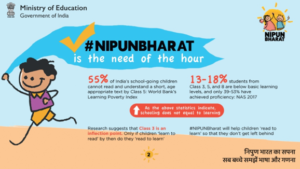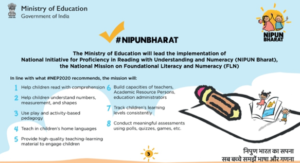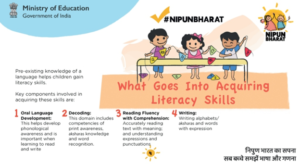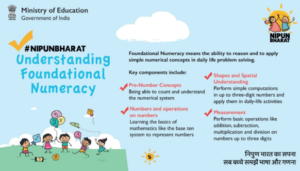Shoring up the foundations.
Relevance
- GS Paper 2 Issues Relating to the Development and Management of Social Sector/Services relating to Health, Education, and Human Resources.
- Tags: #NipunBharat #NEP #NCF # GS2 #IndianExpressEditorialAnalysis.
Why in the News?
NIPUN Bharat’s scope has been reduced by the Ministry of Education to students in Grades 1-2, leaving students in Grade 3 out.
Current State of Foundational Literacy and Numeracy in India
- More than half of India’s children lack essential reading and mathematical skills by the end of primary school.
- National Education Policy (NEP) 2020 proposed a national mission for foundational literacy and numeracy by the end of Grade 3.
- National Initiative for Proficiency in Reading with Understanding and Numeracy (NIPUN Bharat) program launched in 2021 to improve foundational learning for 5 crore students government primary school.
- Despite some restrictions, NIPUN Bharat has started to gradually enhance the academic performance of students in Grades 1-3 in a number of states.
Rollback of NIPUN Bharat’s Scope
- Ministry of Education recently scaled down NIPUN Bharat from Grades 1-2, excluding Grade 3.
- Rationale: Align NIPUN Bharat with NEP 2020 and National Curricular Framework (NCF) 2023, which emphasize a foundational stage including 3 years of preschool and first 2 years of primary school.
- Therefore, it makes sense for the NIPUN Bharat Programme to end at Grade 2, as this is the end of the foundational stage of learning.
Limited Scope of Anganwadi Centers
- Anganwadi centers for 3-6-year-olds largely focus on health, nutrition, and immunization, with limited preschool education.
- Only a small fraction of these centers offer consistent and quality preschool education.
- Establishment of a comprehensive educational system spanning 3 to 8 Years remains a distant objective.
Inaccessible Educational Services
- About 68% of children aged 3to 6 years in India lack access to educational services.
- Many children come from households with low literacy levels, Introduction to literacy often occurs for the first time when they start Grade 1.
- 35% of children struggle with bridging the gap between their home language and the language used in school.
- Primary schooling becomes challenging due to complex linguistic differences.
- Rolling back a Grade 3 program implies surrendering current assistance for an immediate gain and uncertain future results.
Extending Support for Stronger Foundations
- It is recommended that additional assistance be provided to students from Grades 1 to 5.
- This extended period allows children to establish solid language and numeracy fundamentals.
Focus of National Curricular Framework (NCF)
- NCF emphasizes effective teaching methods for children aged 3 to 8 years.
- Approaches include Play-based learning and adaptable learning paces.
- However, the foundational stage, as outlined in NEP and NCF, doesn’t intend to cover the entire spectrum of literacy, numeracy skills, attitudes, and knowledge needed for future learning by Grade 2.
- Majority of research shows that these understandings evolve gradually during the first four or five years of schooling, particularly in Indian contexts.
Misconceptions and Need for Comprehensive Learning Goals
Misunderstanding of Strong Foundations
- Lack of thorough understanding of the importance of laying solid early reading and numeracy foundations may be one reason influencing such decisions.
- There might be an oversimplified perception of literacy, such as the ability to mechanically read words at a specific speed by a certain age.
- Initiatives like NIPUN Bharat might have unintentionally contributed to this simplified perspective.
Importance of Expanding Perspective
- Rather than reducing or scaling back such programs, there’s a greater need to broaden our understanding of early foundational learning.
- Early education should go beyond mechanical literacy and numeracy skills.
Emphasis should be on making literacy relevant to children’s lives,
- nurturing strong oral communication,
- cultivating deep and logical comprehension skills,
- fostering an appreciation for literature,
- developing the capability for written expression.
Expecting comprehensive literacy and numeracy foundations by Grade 2 or 3 might be impractical. Instead, advocating for extended programs through Grades 4 and 5 is crucial. This allows time for robust skill development and aligns with broader educational goals. Scaling back existing programs could hinder progress and risk lagging behind in enhancing foundational learning. Prioritizing comprehensive education over limiting interventions ensures a stronger educational framework.
Source: Indian Express
https://epaper.indianexpress.com/3754499/Delhi/August-28-2023#page/11/1
Mains Question
Explain the significance of the National Initiative for Proficiency in Reading with Understanding and Numeracy (NIPUN Bharat) program in improving foundational learning. Highlight its impact on Grades 1-3?







